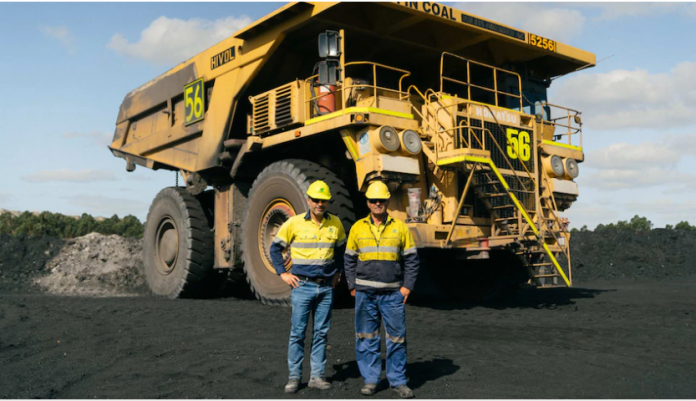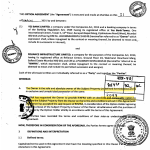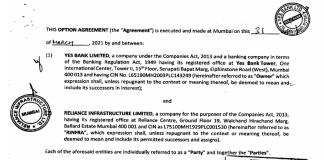By energy reporter Daniel Mercer
Tim Buckley has spent much of his career in finance traversing the proverbial energy landscape.
For much of that time since 2010, those travels have taken him to India, where eye-watering sums of money are being spent energising a country trying to lift more than a billion people out of abject poverty.
Mr Buckley, although an admirer of India in many ways, says there’s an expression that defines key aspects of business on the subcontinent.
“What I’ve found over my last decade studying India is that the Indian financial system has plenty of warts,” said Mr Buckley, director of Climate Energy Finance.
“And probably the biggest wart is the inevitable Indian over-reliance on kicking the can down the road.”
The quirks and pitfalls of Indian finance might seem a world away from the average Australian.
But for more than a million households and businesses living on one side of the country, they are rapidly becoming all too real.
Griffin Coal, which is one of Western Australia’s only two coal mines and a crucial link in the state’s main electricity grid, is broke.
The loss-making enterprise was tipped into receivership a little over a month ago, owing about $1.5 billion to a long list of lenders and creditors.
None is owed nearly quite so much as an institution almost unknown outside its home country.
So, who is this mystery player, and why does it hold WA’s power in its hands?
Giant unknown outside India
For all its obscurity to most Australians, India’s Industrial Credit and Investment Corporation, otherwise known as ICICI Bank, is in reality a behemoth.
The privately owned bank, founded in 1994, has a market capitalisation of more
than $110 billion.
It has loans on its books valued at more than $1 trillion.
“It [ICICI] is the largest private sector bank in India,” Snehal Kamdar, a chartered accountant and insolvency practitioner based in Mumbai, said.
The bank came on to the scene at Griffin in 2010 when a once high-flying Indian conglomerate, Lanco Infratech, shelled out $750 million for the mine.
Lanco’s big foray into Australian energy was fuelled entirely by debt and most — if not all — of that money was provided by ICICI.
Yet right from the get-go, chronic problems became obvious.
“It’s been a debacle,” Mr Buckley said.
“There have been no winners.”
Griffin’s former owner, Ric Stowe, lost his business empire when prices for the mine’s coal were roughly halved overnight.
In taking over the mine, and paying a “massive” premium to do it, Lanco had left itself stuck with contracts that ensured it lost money on practically every tonne of coal it supplied to customers.
What’s more, ambitious plans to ship out 20 million tonnes a year of Griffin’s coal to India went nowhere when the insurmountable costs and logistics became apparent.
From there, Lanco’s woes only deepened as the losses at Griffin mounted and the conglomerate’s debts to ICICI piled up.
One trouble leads to another
In 2017, Lanco became the highest-profile casualty of a shake-up by the Indian government of its bankruptcy laws, toppling into liquidation.
Critically for WA, the collapse left one of the state’s most strategically important energy assets in limbo.
Through its biggest customer, the Bluewaters coal-fired power station, Griffin indirectly supplies about 15 per cent of the power typically used in WA’s biggest electricity system.
Griffin also supplies ASX-listed miner South32, whose Worsley alumina refinery, a big regional employer, depends on the coal.
Mr Buckley said Lanco — and by extension ICICI — failed to do its due diligence.
“Remember, the original reason for buying Griffin Coal wasn’t to supply the West Australian coal-fired power plants,” Mr Buckley said.
“It was actually to export 20 million tonnes a year from the port of Bunbury over to India.
“So it was actually an edict from the central government of India and 10 of India’s largest conglomerates went out and bought coal and gas deposits around the world.
“But they really were late to the party.
“So, they really got the dregs.
“Griffin Coal was one of the worst of the deals and, obviously, India never got a single tonne of coal out of it.”
Griffin’s financial woes have intensified since 2017, and so too have its production problems.
Last year, Griffin invoked force majeure – the so-called God clause – to suspend coal deliveries to Bluewaters, blaming a wetter-than-usual winter for the decision.
It repeated the dose this year.
Desperate needs, desperate deeds
In a bid to help deal with these and other disruptions at Griffin, the rival Premier Coal mine stepped in at several points to provide back-up supplies, whittling down its own stockpiles in doing so.
Premier, though, is now facing its own problems following another wettish winter, declining coal reserves and at least one major safety incident.
The upshot is a critical shortage of coal in WA, where South32 is having to import coal from abroad.
Similarly, state-owned power provider Synergy is also looking to buy coal from the eastern states, while mothballing a big generator to preserve fuel stocks.
On top of this, Griffin was also hit with convictions for failing to meet financial reporting requirements and failing to have a resident Australian director.
Despite owning about 80 per cent of Griffin’s debt, ICICI has maintained a stony silence about its exposure to and plans for the mine.
Mr Buckley said the silence was symptomatic of a banking system where loans that turn bad were often swept under the carpet.
“Insolvency can be pretty hard but it’s all about lancing the boil,” Mr Buckley said.
“In Australia … if a business is financially bankrupt, you can then salvage the operating assets, recapitalise them and then let them get on with it.
“Whereas in India … kicking the can down the road can often go on for five or 10 years, which is certainly bizarre by Australian standards.
“But it is illustrative of what’s happened to the old Ric Stowe empire over the last decade.”
Overseas expansion ‘backfires’
Hemindra Hazari, a Mumbai-based banking research analyst, said Indian banks generally wouldn’t disclose individual loans, no matter how badly they performed.
But to understand how ICICI could have ended up with a busted Australian coal mine, he said it was necessary to know Indian’s recent history.
Mr Hazari said that prior to the collapse of Lehman Brothers and the global financial crisis, India’s central government had encouraged the titans of local industry to expand their overseas footprints.
To do this, he said, they moved in lock-step with banks just like ICICI to snap up foreign assets, often at top price.
“Now, what happened is … the economy turned globally post-Lehman,” Mr Hazari said.
“So, a lot of these assets, which had been acquired at high prices … they all collapsed.
“A lot of other Indian companies were unable to meet their commitments.
“It resulted [in] problems for their lenders.”
According to Mr Hazari, Lanco was in some ways the poster child of India’s corporate misadventures overseas.
But in the broader fallout, he said many Indian companies – and their bankers – were pulling back from the international scene.
“That entire strategy has backfired,” he said.
A riddle wrapped in a mystery
Insolvency practitioner Mr Snehal said Indian law was clear enough about loans that soured and the country had significantly strengthened its bankruptcy provisions.
He said insolvency laws required “non-performing loans” to be written off after three years and there were potentially criminal consequences for a failure to do so.
“There cannot be a lapse in recognition of large losses,” Mr Snehal said.
“It’s serious.”
Nevertheless, he acknowledges that India is not a signatory to international cross-border insolvency laws, a situation which may be adding ever more complexity to the Griffin case.
Amid the uncertainty, whatever steps ICICI might take next are likely known only to the bank, which declined to respond to questions.
Since taking the reins at Griffin five years ago, ICICI has not made a single reference to its exposure to the mine in any public disclosures.
Things often come to light only through the courts, where in September ICICI fought off a bid by Bluewaters to take control of the mine and instead appointed its own receiver.
Experts say the simultaneous appointment of a liquidator also points to the possibility Griffin may tear up its loss-making contracts with customers – including Bluewaters – to demand a far higher price for its coal.
Where this leaves consumers is unclear.
‘No happy ending for anyone’
Mr Buckley, at least, is sure it won’t be anywhere good.
He said one way or another, WA was heading into a potentially scorching summer with its biggest electricity system dangerously vulnerable to a lack of coal supplies.
Even if ICICI accepted its losses and walked away from the mess at Griffin, he said the deeper problems that had been allowed to fester in the state’s coalfields were not going away.
In the event the bank could claw back some of its investment, he said, that price would eventually be passed on to the consumer.
Ultimately, Mr Buckley said the people of WA will end up paying.
“When you’re starting with a mine that has barely broken even or lost money almost every year for a decade, there is no money,” he said.
“There is not a pot of jam at the end of the day.
“Absent the state-government nationalisation of all the loss-making entities, there is no happy ending for anyone.”














